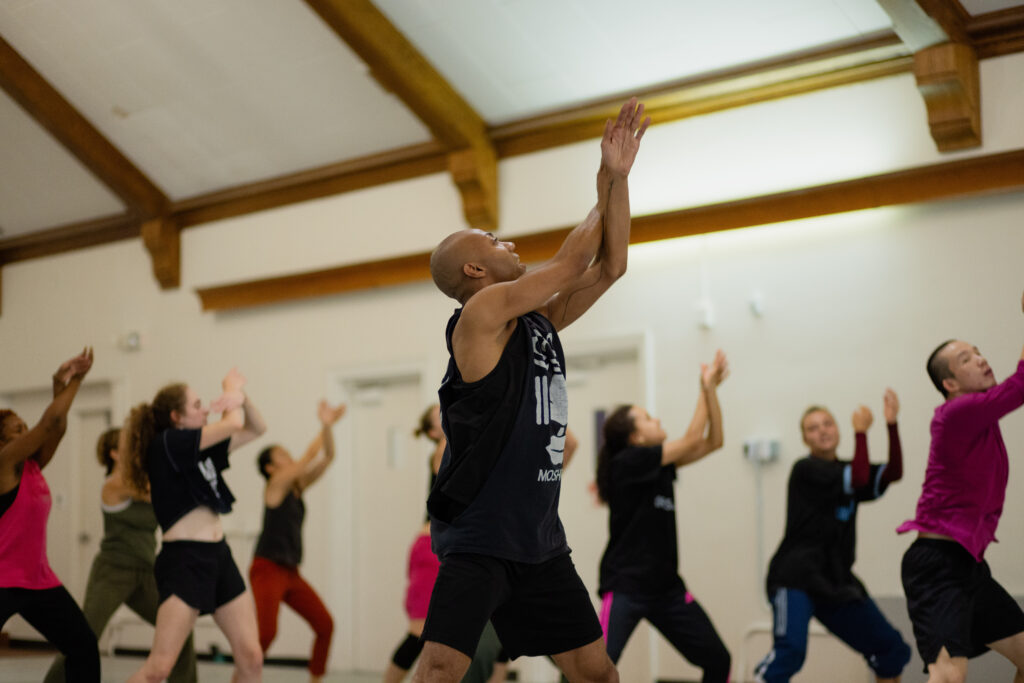Choreographer David Dorfman, a professor at Connecticut College, says students who attend summer dance festival intensives return to campus with something in common: They’ve gone through an artistic growth spurt. “You won’t realize what you learn until weeks afterward, but it has sunk into your cells,” says Dorfman, who attended American Dance Festival’s intensive as a grad student himself in the 1980s and has since taught there as a faculty member. “All these young college students and young professionals are there doing the same thing that you are: They’re sweating. They’re trying things they’ve never done before. And you get this inner leap-of-faith notion, a little forward-thinking confidence that ‘Oh, I can do this.’ ”
At festival intensives, total daily immersion in dance and access to a multitude of artists coming through campus to perform gives students opportunities that they’re unlikely to get at traditional intensives that may focus more squarely on technique. For dancers on the cusp of starting their careers, they can be formative experiences.
Formal and Informal Networking Opportunities
A festival-based training program isn’t just about the training. “You are also building career connections with the artists who are there for the festival,” says Leah Brandon, associate director for The School at Jacob’s Pillow. She points out that Jacob’s Pillow hosts dozens of performances each summer. Students watch those shows, take workshops taught by guest artists from the participating companies—and also live right alongside them.
“You’re all in close quarters, eating in the same cafeteria,” says Tessa Olson, a senior dance major at the University of Illinois Urbana-Champaign, who took classes in Bates Dance Festival’s Professional Training Program last summer while there working as a dance documentation intern. “You really get a chance to know each other in a more informal setting, which creates these really cool, close relationships. It feels like this incubator experience, this magical world specifically for dancers.”
Expanded Possibilities
One major benefit of a festival intensive is the range of work dancers are exposed to. “You’re not pigeonholed to one company, or one technique,” Olson points out. At Bates, she took classes in everything from Afro fusion and Countertechnique to house, trying out styles she’d never done before.
Even just through watching performances, Brandon says, dancers might encounter new choreographers and ideas that could change how they think about their career paths. “It’s just a great variety that you can get exposed to in a short period of time,” Dorfman says. “Anything can happen, and more of everything can be available to you.”

Deepened Artistry
A dance festival presents an array of activities and opportunities for students that go beyond polishing their technique. There are artist talks and discussions to attend. You might get access to archival footage and materials, allowing you to dig deeper into your favorite artists and genres. Visiting companies might have open rehearsals.
A busy campus can also lead to surprises. For instance, last year The Royal Ballet was at Jacob’s Pillow to perform a Wayne McGregor premiere. During that same week, Jessica Wright from Studio Wayne McGregor was setting a new work, based on the McGregor choreographic principles, on the contemporary students. One afternoon McGregor himself popped by the studio to watch one of their rehearsals, then ended up working with the dancers for 45 minutes. “I mean, their minds were blown,” Brandon says. “But they also just saw the whole choreographic principles of Wayne McGregor in a completely different way.”
Who Are Festival Programs Best For?
Festival programs throw a lot at students. Dancers need to be motivated to get the most out of all that’s offered. Those who thrive in this setting are the ones who are serious about developing their artistic voices, open to trying new things, and unafraid of networking. It takes an engaged, curious approach, but it can pay off: Dorfman says that dancers who take full advantage of a festival gain a more finely honed sense of themselves as artists—and a better idea of their next steps.


